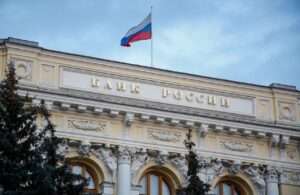

In addition to finally granting Ukraine long-delayed and much-needed military assistance, the House of Representatives today also enacted the REPO Act. That law gives the president the authority to seize $6 billion in Russian government assets currently frozen in the United States and transfer them to Ukraine, in order to help that country resist Russia’s brutal war of aggression.
The Senate will almost certainly pass the REPO Act as well, and President Biden seems certain to sign it and act on it. While $6 billion is not that much compared to the costs of the war, this US action will hopefully incentivize our European allies to confiscate the nearly $300 billion in Russian state assets currently frozen under their jurisdiction.
I have long supported this idea, which is overdue. In a November post, I outlined the reasons and addressed a number of objections, including claims that forfeiture violates the Fifth Amendment’s Takings Clause, arguments about sovereign immunity, arguments that forfeiture is unjust towards the Russian people and fears that it would set a bad precedent that would dissuade foreign investment in the United States.
Here is an excerpt:
There is a staggering $300 billion in frozen Russian state assets located in Western nations supporting Ukraine…. To put this figure in perspective, it is worth noting that the total amount of US aid to Ukraine from February 2022 to July 31, 2023 was approximately $77 billion. The European Union, individual European states and Canada donated approximately $165 billion during the same period…. The $300 billion in frozen assets amounts to some two years of total Western assistance to Ukraine at the current rate of spending!…
[I]In the United States, the private property of aliens is protected against confiscation by the Takings Clause of the Fifth Amendment, which requires the government to pay “just compensation” if it seizes “private property.” Most European nations have similar constitutional protections for private property rights, as well as the European Convention on Human Rights.
But the Fifth Amendment and its European analogues do not offer the same kind of comprehensive protection to the property of foreign governments. This distinction undermines claims by some critics that the uncompensated seizure of Russian state assets would violate the takings clause and similar constitutional guarantees in Europe. It also alleviates concerns that confiscating Russian government assets would create a dangerous slippery slope. The private property rights of aliens would remain protected by constitutional guarantees….
Oona Hathaway argues that confiscating Russian state assets would violate sovereign immunity. I think the Tribe report offers compelling answers to this topic (pp 60-64).
Furthermore, I am not convinced that sovereign immunity is actually a just principle that we have a duty to obey. It is in fact a perversion of justice, which allows rulers to escape responsibility for the violation of human rights and other injustices perpetrated. It was a mistake to read it into the US Constitution. It is equally a mistake to allow it to become a principle of international law. Some laws are so profoundly unjust that we have no duty to respect them. The Sovereign Immunity Act is one such case.
At the very least, sovereign immunity should not be allowed to protect authoritarian states like the Putin regime from confiscation of their assets to fight their wars of aggression, mass murder of civilians, and other large-scale human rights violations . Such rulers do not deserve sovereign immunity any more than mafia bosses….